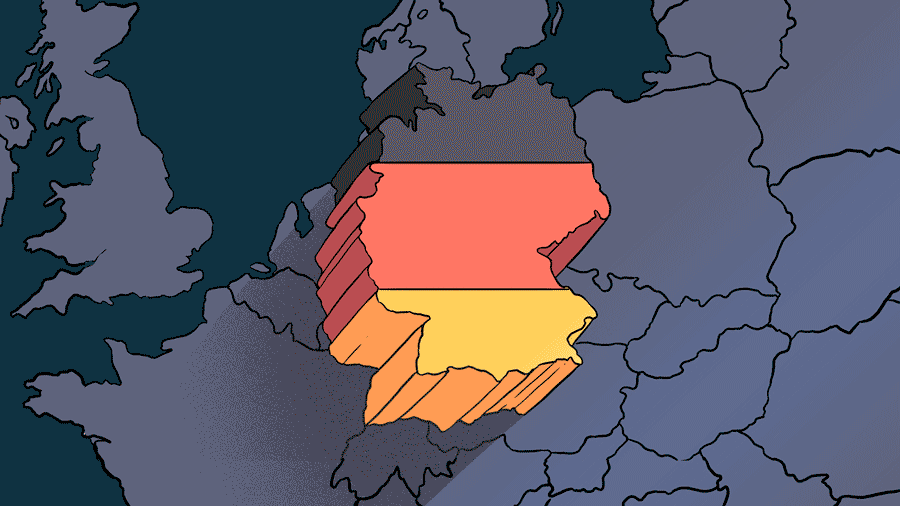Going global sounds good on paper, but it can be hard to find time for sleep.
That’s a shared experience among German entrepreneurs looking to expand in the U.S. Either they’re crossing the Atlantic Ocean, or they’re staying put and combating the notorious time difference between Germany and the U.S. (not to mention that there are four main time zones here).
Follow Crunchbase News on Twitter
“Silicon Valley is 9 hours to Germany, and this really means that they (entrepreneurs) feel like they work all the time,” said Katharina Legge, marketing chief at German-government backed startup incubator German Accelerator Tech (GAT). “Because they work on U.S. time on their U.S. business, but they also want to be responsible for the German business.”
Despite all the difficulties, German startups are tracing an upward trail on the U.S. venture landscape.
Venture deals in German startups led by U.S. investors have been consistently increasing since 2012. This year, German companies already scored 22 funding rounds that are led by U.S. investors, according to Crunchbase data.

Going Global, Staying Awake
Germany’s venture scene may be much smaller than America’s, but German startups have increasing appetite for international expansion. Per a 2017 survey by KPMG (link in German), 82.7% of German startups have plans to expand overseas.
However, on a global scale, venture funding and new technology are still very concentrated in the U.S. This means that for many German startups, a large part of going global involves breaking into the U.S. market.
According to GAT’s Company Scout Konstantin Krauss, a U.S. company aiming to be a global player can just grow in its home turf because the U.S. market is already so big. Meanwhile, a German startup can grow to a sustainable size in Germany, but once it enters the global market, it’s still small compared to its U.S. and international counterparts.
A German headquarters also means that it takes extra effort to win the trust of U.S. investors.
That’s been the finding for Tobias Bahnemann, co-founder of ultrasound sensor startup Toposens, who has been searching for sales and funding opportunities in the U.S. He told Crunchbase News that many U.S. investors are less interested in startups based overseas because many haven’t built a strong U.S. presence, and there are also potential legal complications such as different tax laws in Germany than in the U.S.
“The Valley investors are pretty spoiled because there are so many good activities going on [here in San Francisco],” he said, joking: “Many of them have the mindset: if I cannot reach my startup with my bicycles then I will not invest.”
Culture Shock
As if all the challenges of time difference and legal issues are not enough, German entrepreneurs in the U.S. are not exempted from culture shock. After all, Germany and the U.S. have very different startup ecosystems.
To Bahnemann, one of the most shocking things he found in Silicon Valley was the speed at which Americans do business. He recalled an instance in which he was introduced to two investors late Friday evening, and by Sunday midday he already finished two appointments with them.
“That’s something that would never happen in Germany,” said Bahnemann. “In Germany, the weekend is kind of like a holy thing that you don’t touch.”
Americans are also more open and willing to share, GAT’s Krauss and Legge pointed out.
In Germany, Krauss said, companies are more private about their business progress and partnerships, while U.S. founders often speak openly about their problems and achievements.
“This is something that is completely new for Germans when they come to U.S., that it’s so open that people share so much,” said Krauss.
Both Bahnemann and Krauss mentioned that the U.S. and German styles of pitching and storytelling also differ quite a bit. Germans tend to fill their powerpoint slides with detailed technical information about their companies. In the U.S., however, the slides are there to get clients and investors hooked. For Bahnemann, getting used to the American style of selling was his biggest takeaway from his time at the GAT program.
The networking culture in the U.S. also catches some German entrepreneurs off guard.
“It’s a new country. It’s new people. It’s a different style of doing business. It’s quicker. It’s louder. It’s more intensive,” said Bahnemann, noting that some German entrepreneurs, especially technical founders, are less willing to go out and talk to people about their work.
For German entrepreneurs willing to overcome those hurdles, however, recent investment trends indicate there’s a ready and growing supply of U.S. backers open to a cross-Atlantic relationship.

Stay up to date with recent funding rounds, acquisitions, and more with the Crunchbase Daily.


![Illustration of robot nesting doll. [Dom Guzman]](https://news.crunchbase.com/wp-content/uploads/AI_robotics_Nesting_Doll-470x352.jpg)
![Illustration of "black friday' gifts. [Dom Guzman]](https://news.crunchbase.com/wp-content/uploads/2020/11/Black_Friday_-470x352.png)
![Computer generating AI data. [Dom Guzman]](https://news.crunchbase.com/wp-content/uploads/AI-generated-470x352.jpg)
![Illustration of a guy watering plants with a blocked hose - Global [Dom Guzman]](https://news.crunchbase.com/wp-content/uploads/quarterly-global-3-300x168.jpg)
67.1K Followers